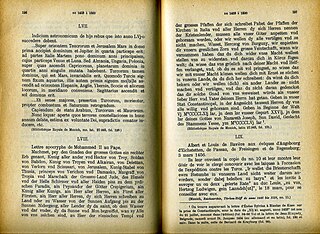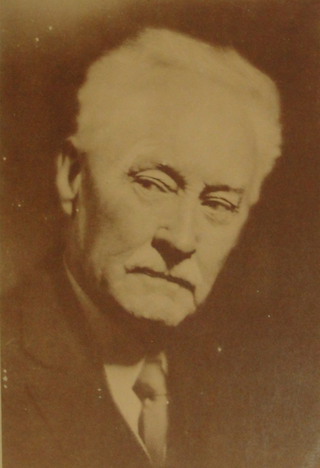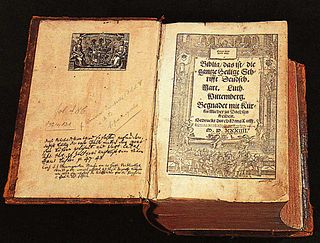Related Research Articles

Apocrypha are biblical or related writings not forming part of the accepted canon of Scripture. While some might be of doubtful authorship or authenticity, in Christianity, the word apocryphal (ἀπόκρυφος) was first applied to writings which were to be read privately rather than in the public context of church services. Apocrypha were edifying Christian works that were not considered canonical Scripture. It was not until well after the Protestant Reformation that the word apocrypha was used by some ecclesiastics to mean "false," "spurious," "bad," or "heretical."

The extant manuscripts of the book Antiquities of the Jews, written by the first-century Jewish historian Flavius Josephus around AD 93–94, contain two references to Jesus of Nazareth and one reference to John the Baptist.
The New Testament (NT) is the second division of the Christian biblical canon. It discusses the teachings and person of Jesus, as well as events relating to first-century Christianity. The New Testament's background, the first division of the Christian Bible, is called the Old Testament, which is based primarily upon the Hebrew Bible; together they are regarded as sacred scripture by Christians.
George Albert Wells was an English scholar who served as Professor of German at Birkbeck, University of London. After writing books about famous European intellectuals, such as Johann Gottfried Herder and Franz Grillparzer, he turned to the study of the historicity of Jesus, starting with his book The Jesus of the Early Christians in 1971. He is best known as an advocate of the thesis that Jesus is essentially a mythical rather than a historical figure, a theory that was pioneered by German biblical scholars such as Bruno Bauer and Arthur Drews.

The Gospel of Nicodemus, also known as the Acts of Pilate, is an apocryphal gospel claimed to have been derived from an original Hebrew work written by Nicodemus, who appears in the Gospel of John as an associate of Jesus. The title "Gospel of Nicodemus" is medieval in origin. The dates of its accreted sections are uncertain, but the work in its existing form is thought to date to around the 4th or 5th century AD.
The historicity of Jesus is the question of whether or not Jesus of Nazareth historically existed. The question of historicity was generally settled in scholarship in the early 20th century, and the idea that Jesus was a mythical figure still is and has been considered a fringe theory in academic scholarship for more than two centuries, but has gained popular attention in recent decades due to the growth of the internet.
The term "historical Jesus" refers to the life and teachings of Jesus as interpreted through critical historical methods, in contrast to what are traditionally religious interpretations. It also considers the historical and cultural contexts in which Jesus lived. Virtually all scholars of antiquity accept that Jesus was a historical figure, and the idea that Jesus was a mythical figure has been consistently rejected by the scholarly consensus as a fringe theory. Scholars differ about the beliefs and teachings of Jesus as well as the accuracy of the biblical accounts, with only two events being supported by nearly universal scholarly consensus: Jesus was baptized and crucified.

The New Testament apocrypha are a number of writings by early Christians that give accounts of Jesus and his teachings, the nature of God, or the teachings of his apostles and of their lives. Some of these writings were cited as scripture by early Christians, but since the fifth century a widespread consensus has emerged limiting the New Testament to the 27 books of the modern canon. Roman Catholic, Eastern Orthodox, and Protestant churches generally do not view the New Testament apocrypha as part of the Bible.

Forged: Writing in the Name of God – Why the Bible's Authors Are Not Who We Think They Are is a book by American New Testament scholar Bart D. Ehrman, published in 2011 by HarperCollins.

M source, which is sometimes referred to as M document, or simply M, comes from the M in "Matthean material". It is a hypothetical textual source for the Gospel of Matthew. M Source is defined as that 'special material' of the Gospel of Matthew that is neither Q source nor Mark.

The Christ myth theory, also known as the Jesus myth theory, Jesus mythicism, or the Jesus ahistoricity theory, is the view that the story of Jesus is a work of mythology with no historical substantiality. Alternatively, in terms given by Bart Ehrman paraphrasing Earl Doherty, it is the view that "the historical Jesus did not exist. Or if he did, he had virtually nothing to do with the founding of Christianity."
Bruce Manning Metzger was an American biblical scholar, Bible translator and textual critic who was a longtime professor at Princeton Theological Seminary and Bible editor who served on the board of the American Bible Society and United Bible Societies. He was a scholar of Greek, New Testament, and New Testament textual criticism, and wrote prolifically on these subjects. Metzger was an influential New Testament scholar of the 20th century. He was elected to the American Philosophical Society in 1986.
The unknown years of Jesus generally refers to the period of Jesus's life between his childhood and the beginning of his ministry, a period not described in the New Testament.
Craig Alan Evans is an American biblical scholar. He is a prolific writer with 70 books and over 600 journal articles and reviews to his name.

William Benjamin Smith was a professor of mathematics at Tulane University, best known as a proponent of the Christ myth theory.

Luther's canon is the biblical canon attributed to Martin Luther, which has influenced Protestants since the 16th-century Protestant Reformation. While the Lutheran Confessions specifically did not define a biblical canon, it is widely regarded as the canon of the Lutheran Church. It differs from the 1546 Roman Catholic canon of the Council of Trent in that it rejects the deuterocanonical books and questions the seven New Testament books, called "Luther's Antilegomena", four of which are still ordered last in German-language Luther Bibles to this day.
Historiography of early Christianity is the study of historical writings about early Christianity, which is the period before the First Council of Nicaea in 325. Historians have used a variety of sources and methods in exploring and describing Christianity during this time.

Oral gospel traditions is the hypothetical first stage in the formation of the written gospels as information was passed by word of mouth. These oral traditions included different types of stories about Jesus. For example, people told anecdotes about Jesus healing the sick and debating with his opponents. The traditions also included sayings attributed to Jesus, such as parables and teachings on various subjects which, along with other sayings, formed the oral gospel tradition. The supposition of such traditions have been the focus of scholars such as Bart Ehrman, James Dunn, and Richard Bauckham, although each scholar varies widely in his conclusions, with Ehrman and Bauckham publicly debating on the subject.

Christian sources such as the New Testament books in the Christian Bible, include detailed accounts about Jesus, but scholars differ on the historicity of specific episodes described in the biblical accounts of Jesus. The only two events subject to "almost universal assent" are that Jesus was baptized by John the Baptist and was crucified by the order of the Roman Prefect Pontius Pilate.
F. David Farnell is an American New Testament scholar, Christian minister, and is the new pastor of theological training at Redeemer Bible Church in Phoenix, Arizona. He was formerly professor of New Testament studies at The Master's Seminary. He promotes a conservative approach to New Testament studies. Farnell's works include the book The Jesus Crisis: The Inroads of historical Criticism into Evangelical Scholarship and The Jesus Quest: The Danger from Within. His writings on biblical inerrancy have been endorsed by John F. MacArthur, Albert Mohler, and Paige Patterson. He is also the pastor of Grace Bible Church in Oxnard, California.
References
- ↑ "Robert E. Van Voorst". Western Theological Seminary. Archived from the original on May 17, 2008. Retrieved July 14, 2008.
- ↑ "Pastor's Bible Study: Volume Three: Meet the Contributors". The New Interpreter's Bible. Archived from the original on June 5, 2008. Retrieved July 14, 2008.
- ↑ Robert E. Van Voorst (2000). Jesus Outside the New Testament: An Introduction to the Ancient Evidence . Grand Rapids, MI: Eerdmans. pp. 217. ISBN 0-8028-4368-9.
- ↑ Allen Kerkeslager (April 16, 2001). "Review of Jesus Outside the New Testament" (PDF). Review of Biblical Literature. Retrieved July 14, 2008.
- ↑ Darrell L. Bock (July–September 2001). "Review of Jesus Outside the New Testament". Bibliotheca Sacra. 158 (631): 381.
- ↑ Helen K. Bond (April 2001). "Jesus: Evidence and Significance". Expository Times. 112 (7): 238–239. doi:10.1177/001452460111200710. S2CID 170714127.
- ↑ Curt Niccum (2004). "Review of Jesus Outside the New Testament". Restoration Quarterly. 46 (2): 120–122.
- ↑ G. Van Belle (December 2000). "Review of Jesus Outside the New Testament". Ephemerides Theologicae Lovanienses. 66 (4): 503–504.
- ↑ Thomas O'Loughlin (January 2001). "Review of Jesus Outside the New Testament". Catholic Biblical Quarterly . 63 (1): 163–164.
- ↑ John Goertzen (December 2001). "Review of Jesus Outside the New Testament". Journal of the Evangelical Theological Society . 44 (4): 731–732.
- 1 2 William Varner (Fall 2000). "Review of Jesus Outside the New Testament". Master's Seminary Journal. 11 (2): 270–272.